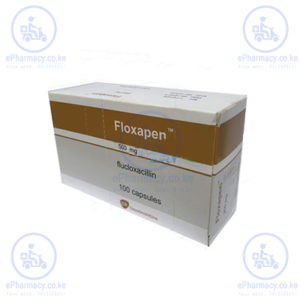Description
Uses and Administration of Flucloxacillin in Kenya
Flucloxacillin is an penicillin derived antibiotic used primarily for the treatment of bacterial infections due to staphylococci resistant to benzylpenicillin. These include bone and joint infections, endocarditis, pneumonia, skin infections (including soft-tissue infections), and toxic shock syndrome.
Administration and dosage. Flucloxacillin is given parenterally and by mouth as the sodium or magnesium salt. Oral doses should be taken at least 30 minutes before meals as the presence of food in the stomach reduces absorption. In severe renal impairment a reduction in dosage may be necessary.
The usual adult dose by mouth or by intramuscular injection is 250 mg four times daily. It is given intravenously in a dose of 0.25 to 1 g four times daily by slow injection over 3 to 4 minutes or by intravenous infusion. All systemic doses may be doubled in severe infections; up to 8 g daily in 3 or 4 divided doses may be given for osteomyelitis and up to 12 g in 6 divided doses for endocarditis.
Flucloxacillin in Kenya has been given by other routes in conjunction with systemic therapy. It has been given in a dose of 250 to 500 mg daily by intra-articular injection, dissolved if necessary in a 0.5% solution of lidocaine hydrochloride, or by intrapleural injection in a dose of 250 mg daily. Using powder for injection, 125 to 250 mg has been dissolved in 3 mL of sterile water and inhaled by nebuliser 4 times daily.
Children up to 2 years of age may be given one-quarter the adult dose and those aged 2 to 10 years one-half the adult dose.
Flucloxacillin may be used with other antibacterials, including ampicillin (known as co-fluampicil), to produce a wider spectrum of activity. If flucloxacillin is given with an aminoglycoside the two drugs should not be mixed.
Adverse Effects and Precautions of Flucloxacillin/Floxapen in Kenya
Hepatitis and cholestatic jaundice have been reported occasionally with flucloxacillin and may be delayed in onset for up to several weeks after treatment has been stopped; older Kenyan patients and those receiving flucloxacillin for more than 2 weeks are at greater risk. Agranulocytosis and neutropenia have been associated rarely with isoxazolyl penicillins such as flucloxacillin. Phlebitis has followed intravenous infusion.
Incompatibility of Flucloxacillin.
Single-ingredient Preparations of Flucloxacillin




Reviews
There are no reviews yet.